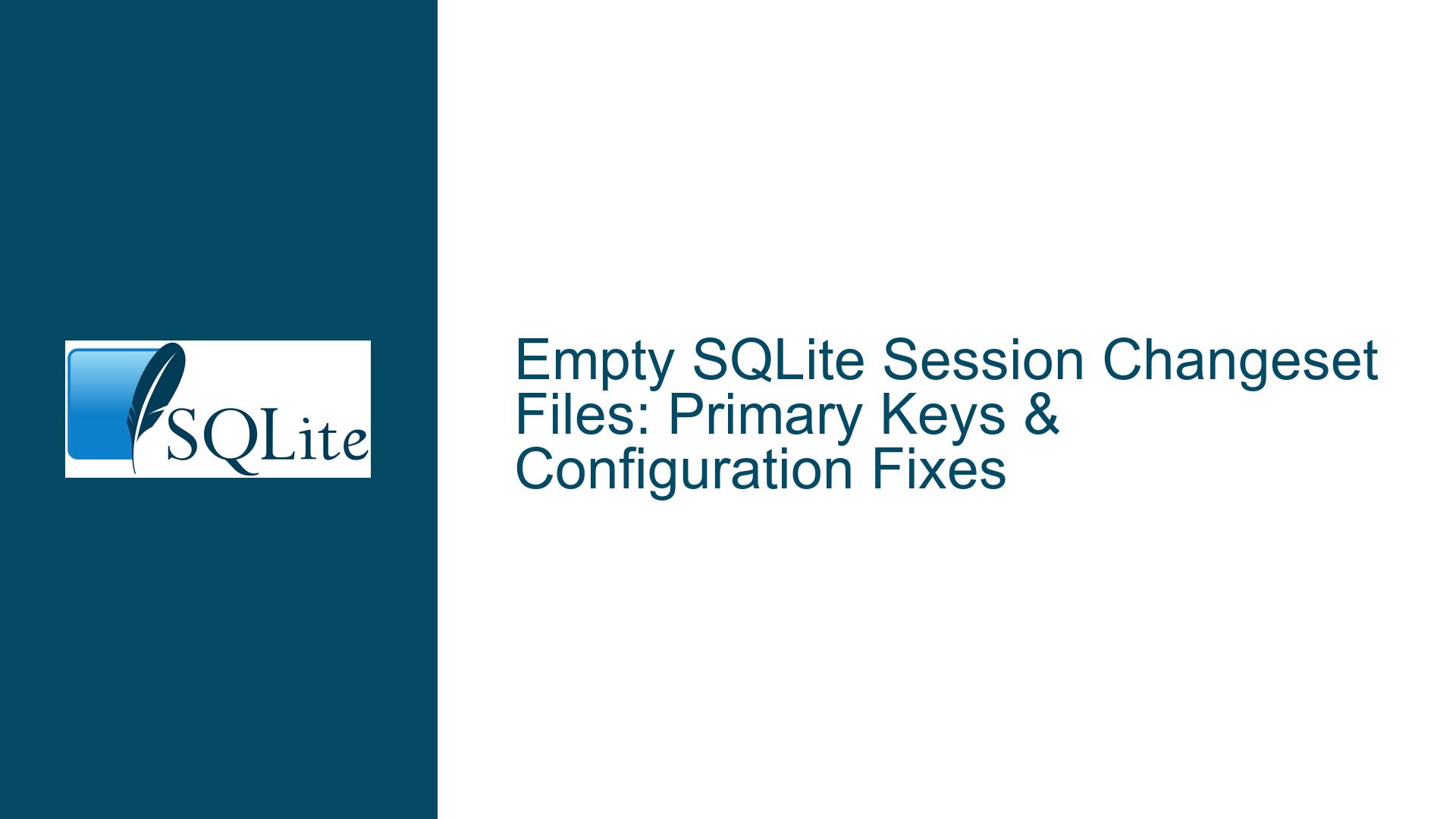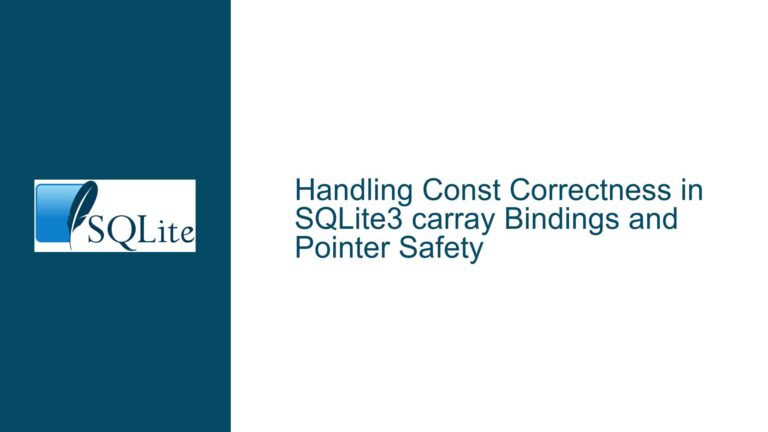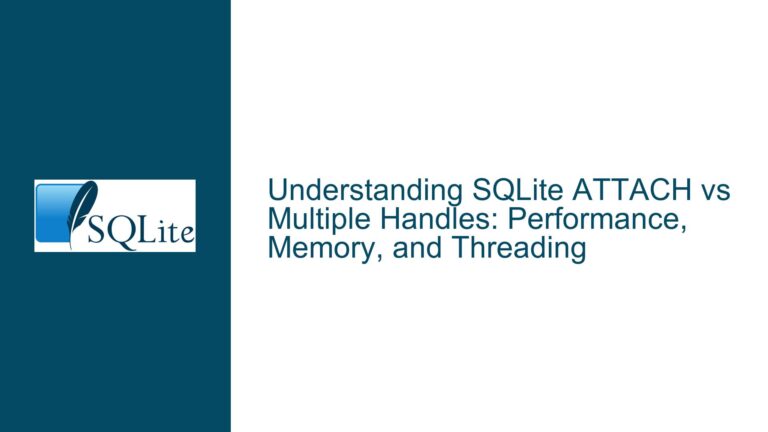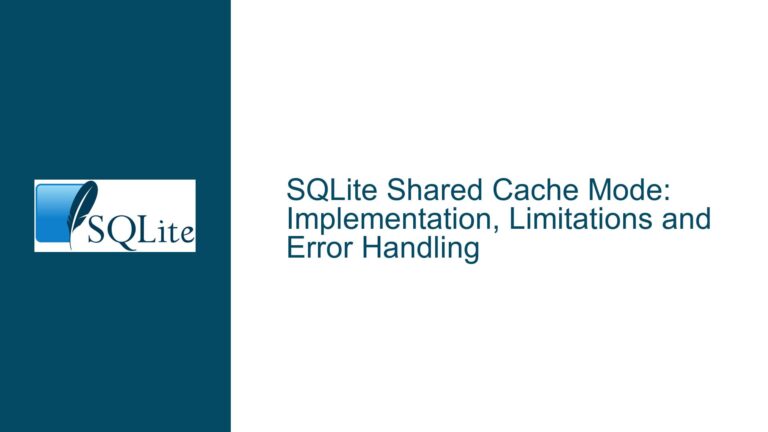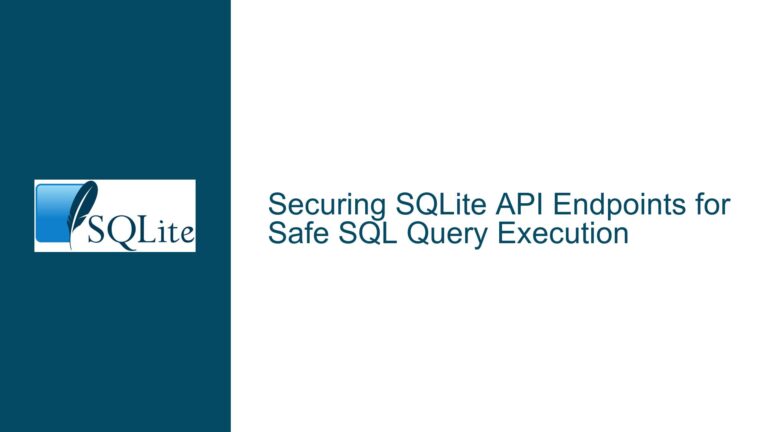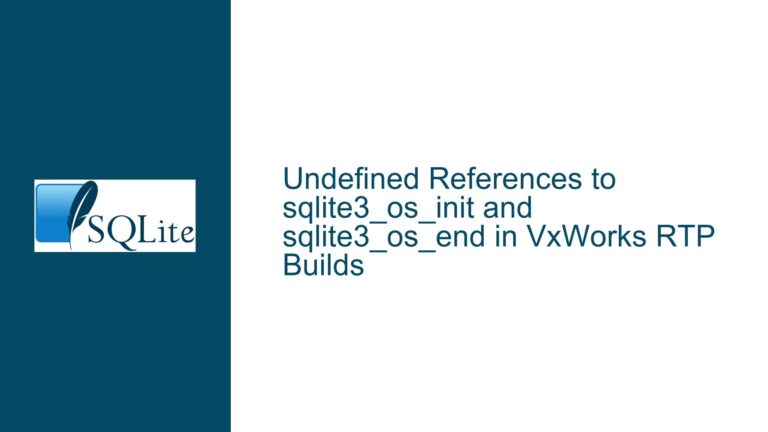Empty SQLite Session Changeset Files: Primary Keys & Configuration Fixes
Issue Overview: Changeset Files Remain Empty Despite DML Operations
When working with SQLite’s session extension to capture database changes into a changeset file, users frequently encounter situations where the generated changeset file (e.g., c.bin) contains zero bytes. This occurs even after executing valid Data Manipulation Language (DML) operations like INSERT, UPDATE, or DELETE on tables attached to a session. The core problem revolves around the session extension’s inability to detect or record changes under specific configuration scenarios.
The session extension is designed to track row-level changes to database tables and serialize them into binary changeset/patchset files. These files are critical for replication, audit logging, or synchronizing changes across distributed systems. However, three critical failure modes emerge:
- Structural Deficiencies in Table Schema: Tables lacking primary keys or explicit
WITHOUT ROWIDdeclarations prevent the session extension from uniquely identifying rows. This violates the session mechanism’s requirement for deterministic row identification during change tracking. - Misconfiguration of Session Parameters: Incorrect use of
.sessionsubcommands (e.g., failing to attach tables, using indirect mode improperly, or omitting session names) disrupts the linkage between the session object and the target tables. - Version or Build Compatibility Issues: Using an SQLite build without session extension support or attempting to apply changesets with incompatible tools exacerbates the problem.
The interplay between these factors often leads to silent failures where changeset files contain no data despite apparent success in DML execution. Users expecting near-real-time change data capture (CDC) for systems like Kafka or NATS face roadblocks without resolving these issues.
Primary Causes: Missing Primary Keys, Attachment Errors, and Build Limitations
1. Absence of Primary Keys or Row Identifiers
SQLite’s session extension relies on primary keys or WITHOUT ROWID tables to uniquely identify rows. When a table lacks these features, the extension cannot:
- Track
UPDATEorDELETEoperations accurately, as it cannot resolve which row was modified. - Generate a changeset, as the binary format requires primary key information to encode row identities.
Example Failure Scenario:
CREATE TABLE tblFirst (key INTEGER, value TEXT); -- No PRIMARY KEY
.session open main mysession
.session mysession attach tblFirst
INSERT INTO tblFirst VALUES(1, 'one'); -- No changeset recorded
The absence of a primary key in tblFirst results in an empty c.bin file.
2. Improper Session Attachment and Filtering
The .session attach subcommand binds a session to specific tables. Common pitfalls include:
- Misspelled Table Names: Attaching a non-existent table (e.g.,
.session attach tblFristinstead oftblFirst) silences errors but captures no changes. - Failure to Attach: Omitting
.session attachentirely leaves the session unaware of which tables to monitor. - Indirect Mode Misuse: Indirect sessions (
indirect on) require triggers to be manually created, which users often overlook.
Example of Incomplete Attachment:
.session open main mysession -- No tables attached
INSERT INTO t1 VALUES(1, 'test'); -- Session ignores changes
3. Build-Specific Omissions or Toolchain Gaps
- Session Extension Not Compiled In: While the SQLite shell (
sqlite3) often includes the session extension, custom builds might exclude it. The presence of the.sessioncommand in the shell’s help menu confirms its availability. - Missing
changesetTool: Thechangesetutility (for applying/inspecting changesets) isn’t part of the standard shell and requires compilation from source, which users may neglect.
Solutions: Schema Corrections, Session Validation, and Toolchain Setup
Step 1: Enforce Primary Keys or Row Identifiers
Modify Table Schemas:
Ensure all tables tracked by sessions have explicit primary keys or use WITHOUT ROWID. For existing tables without primary keys, recreate them:
CREATE TABLE tblFirst (
key INTEGER PRIMARY KEY, -- Add PRIMARY KEY
value TEXT
);
Verify Schema Compliance:
Query sqlite_schema to confirm primary keys:
SELECT sql FROM sqlite_schema WHERE name = 'tblFirst';
-- Output should include PRIMARY KEY
Step 2: Validate Session Configuration
Attach Tables Explicitly:
After opening a session, attach each table individually:
.session open main mysession
.session mysession attach tblFirst
Check Session Status:
Use .session isempty to confirm the session detects changes:
.session mysession isempty -- Returns 0 (non-empty) if changes exist
Avoid Indirect Mode Unless Required:
Indirect mode (indirect on) necessitates manual trigger creation. Use direct mode (default) for automatic trigger management:
.session mysession indirect off -- Ensure indirect mode is disabled
Step 3: Generate and Inspect Changesets
Write Changeset After DML:
Execute DML operations within the same session before writing the changeset:
INSERT INTO tblFirst VALUES(1, 'one');
.session mysession changeset c.bin -- Capture after INSERT
Inspect Binary Output:
Use xxd (Linux/macOS) or a hex editor to verify non-empty files:
xxd c.bin
00000000: 5402 0100 7462 6c46 6972 7374 0012 0001 T...tblFirst....
00000010: 0000 0000 0000 0001 0303 6f6e 65 ..........one
Step 4: Compile and Use the changeset Tool
Build from Source:
Download the SQLite amalgamation and compile changeset:
wget https://sqlite.org/src/tarball/sqlite.tar.gz
tar xzf sqlite.tar.gz
cd sqlite
./configure
make changeset
Convert Changesets to JSON:
Pipe changeset output to JSON using the compiled tool:
./changeset c.bin | jq # Requires jq for formatting
{
"table": "tblFirst",
"op": "INSERT",
"row": [1, "one"]
}
Step 5: Automate Multi-Table Capture
Attach All Tables via Scripting:
Use SQLite’s .tables command to generate attachment commands dynamically:
.tables
-- For each table, issue: .session mysession attach tblname
Implement Triggers for Custom CDC:
For systems requiring JSON output without changesets, create audit triggers:
CREATE TABLE audit_log (id INTEGER PRIMARY KEY, change_json TEXT);
CREATE TRIGGER log_tblFirst_insert AFTER INSERT ON tblFirst
BEGIN
INSERT INTO audit_log (change_json)
VALUES (json_object('op', 'INSERT', 'new', json_object('key', NEW.key, 'value', NEW.value)));
END;
By addressing primary key requirements, validating session attachments, and leveraging SQLite’s toolchain, users can reliably generate changesets and integrate them with modern data pipelines. Persistent empty files typically trace back to schema oversights or misapplied session commands, both resolvable through methodical validation.
